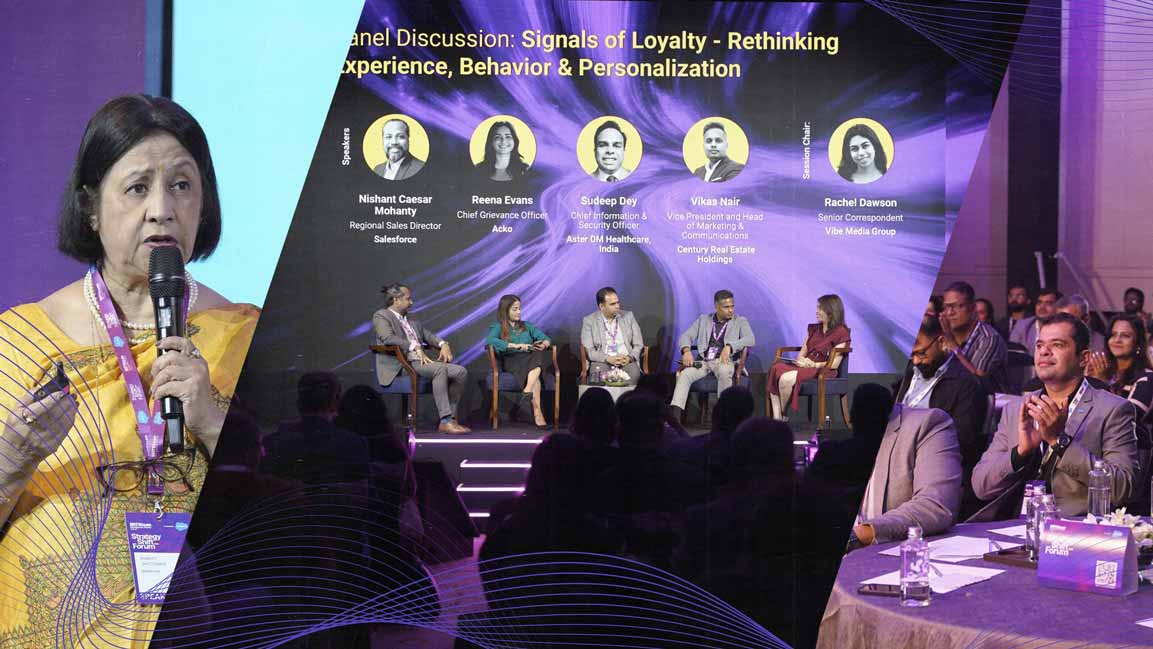At SSF Bengaluru, Leaders Nail Down What It Takes to Make AI Work
With a focus on execution, leaders drilled into how to move AI from pilot to production by governing autonomy, aligning data and delivery, and training teams for speed and scale at the Bengaluru edition of the Strategy Shift Forum.
Topics
News
- Adani Power Sets Up Nuclear Subsidiary
- Musk Unveils xAI Overhaul, Lunar AI Ambitions
- Former GitHub CEO Dohmke Raises $60 Million to Build AI Code Infrastructure
- Leadership Shakeup Deepens at xAI as Two Co Founders Exit
- India Slashes Social Media Takedown Window to Three Hours
- Cisco Moves to Relieve AI Data Center Gridlock With New Chip

Business and technology leaders met on September 25 at Conrad Bengaluru for the Strategy Shift Forum, hosted by MIT Sloan Management Review India and powered by Salesforce, to drill down on data-driven execution and reliable, human-aware systems.
Ravi Raman, Publisher of MIT Sloan Management Review India, set the tone for the forum with a short welcome that framed the day around execution. The first keynote, The Age of AI Discovery, came from Neil Thompson, the Director of the FutureTech Research Project at the Massachusetts Institute of Technology.
He walked the room through how AI systems are already accelerating science and where adoption is likely to go next. Thompson’s message was steady: Value comes when teams match ambitio with the right economics and the right evaluation. Speed matters, but so do data quality, compute choices, and clear tests that reflect real-world messiness.
Salesforce leaders followed with a customer operations keynote that showed humans and agents working side by side. They focused on Agentforce, Salesforce’s digital labor platform, and how a unified, trusted data layer lets governed agents extend teams in service and sales.
The examples were practical. Faster KYC checks. Stronger fraud detection. Better first-contact resolution. The thread running through each was the same. Autonomy is useful when it sits inside guardrails and when it is accountable to outcomes teams already track.
A fireside conversation on leadership brought together behavioral science and crisis negotiation. Patrick Fagan, a bestselling author and Chief Scientific Officer at Capuchin Behavioural Science, and Scott Walker, an international crisis negotiator and Sunday Times bestselling author, explored how leaders make decisions when information is incomplete and pressure is high.
Parallel tracks: Marketing, Sales and Tech
After a coffee break the forum moved into three parallel tracks designed to turn ideas into playbooks.
The CX and Marketing track examined how loyalty shifts when interactions become real time. Speakers from Salesforce, Acko, Aster DM Healthcare, and Century Real Estate discussed how to use first-party data and consent by design to make experiences feel timely and personal without crossing lines.
The conversation marked a move away from calendar-driven campaigns toward moment-based orchestration, where signals guide actions across channels.
Patrick Fagan then led a 90-minute masterclass with a group exercise. He connected everyday behavioral cues to design choices and showed how small, tested changes can lift conversion when they are grounded in insight rather than rule of thumb. The emphasis was on discipline. Use experiments. Read the signals. Scale what works.
The Sales and Growth track took a direct view of commercial execution. A panel featuring leaders from Raymond Lifestyle, Salesforce, Total Environment, and Britannia Industries asked a blunt question. Are teams chasing more deals or closing them smarter? The answers came back to timing and visibility.
Real-time signals sharpen territory planning and account prioritization. Predictive insight can coach reps on live opportunities and prepare them better for meetings. The goal is not more tools, but fewer blind spots and faster follow-through.
Scott Walker’s two-part masterclass then translated high-stakes negotiation principles into daily sales decision-making. The exercises focused on staying clear under pressure, aligning teams, and turning risk into a structured advantage.
The Tech and IT track centered on data unification and instant action. Speakers from Gen Digital, Reliance Retail, Salesforce, and Digit Insurance shared how they are turning fragmented information into a single decision layer that can trigger the right moves inside CRMs, operations platforms, and underwriting tools.
The message was pragmatic. Make the stack think and act as one. Abhinav Mishra of MIT Sloan Management Review India chaired the session.
Neil Thompson returned with a masterclass on AI automation and the future of work. He outlined which tasks are attractive to automate, where human–AI collaboration beats replacement, and how different task types change worker experience. For leaders planning their workforce, the guidance was to map tasks carefully and to pair automation with training so teams are ready for the shift.
Across the day a few themes repeated. First, autonomy must be governed. Agentic systems work when they operate on trusted data, inside clear policies, and with outcome metrics that teams already respect.
Second, scale is a strategy problem as much as a tech problem. The panels stressed data contracts, feature stores, and human-in-the-loop review to keep quality high as systems move from pilots to production.
Third, leadership still decides speed. The sessions on bias, behavior, and negotiation underscored that decisions under uncertainty can be trained and improved.
The Bengaluru summit followed an earlier Delhi edition of the Strategy Shift Forum held last month.






